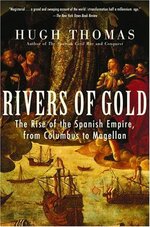itmaiden
Hero Member
- Sep 28, 2005
- 575
- 7
We always discuss the Archives of the Indies. There may be information and a better historical understanding to be gained by learning about the Council of the Indies.
http://en.wikipedia.org/wiki/Council_of_the_Indies
So Columbus gets the shaft...enters the Roman Catholic Church...
What many are not aware of is the role of the Roman Catholic Church in controlling the thrones in many countries, always seeking wealth and world political power. The New World colonization carried with it the struggles between Jewish families and other "heretics" trying to establish safe homes in the new land, while at the same time their tormentors (via the Inquisition) were trying to maintain control over territory and wealth.
This is not a slur to Catholics on this board, just historical fact, and it plays into understanding the events of the time period. While many believe the Inquisition ended much earlier, it continued at least in part through the 1800's. Was the Inquisition really a matter of "religious" beliefs, or a matter of wealth and power ? Were the Treasure Fleets accumulating wealth for "Spain" or for the Roman Catholic Church which controlled Spain at the time under the guise of "Spain" ?
False Flag for sure.
itmaiden
http://en.wikipedia.org/wiki/Council_of_the_Indies
So Columbus gets the shaft...enters the Roman Catholic Church...
What many are not aware of is the role of the Roman Catholic Church in controlling the thrones in many countries, always seeking wealth and world political power. The New World colonization carried with it the struggles between Jewish families and other "heretics" trying to establish safe homes in the new land, while at the same time their tormentors (via the Inquisition) were trying to maintain control over territory and wealth.
This is not a slur to Catholics on this board, just historical fact, and it plays into understanding the events of the time period. While many believe the Inquisition ended much earlier, it continued at least in part through the 1800's. Was the Inquisition really a matter of "religious" beliefs, or a matter of wealth and power ? Were the Treasure Fleets accumulating wealth for "Spain" or for the Roman Catholic Church which controlled Spain at the time under the guise of "Spain" ?
False Flag for sure.
itmaiden





